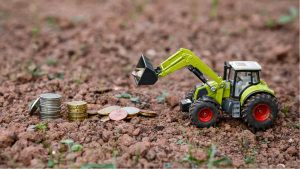“Agriculture technology is designed to let…farmers grow more food using less pesticides, energy, water, and resources, enhancing farm yields,” consulting firm Deloitte has reported. Of course, producing more food while using fewer resources and less potentially harmful pesticides is great for farmers, consumers, and the environment. This backdrop has led to this list of agri-tech stocks to buy.
Also noteworthy for investors is that agricultural technology is becoming a big business as Deloitte expects the sector to generate $18 billion of revenue in 2024. And illustrating how quickly agricultural technology is growing, the firm reports that its sales will increase at a compound annual growth rate of 19% “between 2020 and 2024.”
Meanwhile, the number “of Internet of Things end points” related to agricultural technology will soar about 50% to almost 300 million in 2024. Also noteworthy is that, as part of the global struggle against climate change, agricultural products are being used to create transportation fuel on a wide scale. For investors who want to cash in on the very rapid growth of the agri-tech sector, here are three top agri-tech stocks to buy.
Deere (DE)

Deere’s (NYSE:DE) “See & Spray” system uses artificial intelligence “to detect and accurately target weeds.” In the process, the technology allows farmers to use much less pesticide than in the past when they had to cover all of their crops in the insect-killing liquids.
Also importantly, the firm is in the process of reaching its goal of making agriculture “fully autonomous” for some crops, including corn and soybeans, by 2030. According to “experts” cited by Bloomberg, AI could enable farmers to double their crop yields by 2050. If that prediction winds up being even in the ballpark, you can bet that farmers will be willing to pay Deere much more for its AI-enabled products than they currently shell out for its conventional offerings. As a result, I view DE stock as one of the best agri-tech stocks to buy.
And powered by “sensors and robotic,” Deere has launched “ExactShot (which) reduces the amount of starter fertilizer needed during planting by more than 60 percent,” Popular Science reported.
Corteva (CTVA)

In September, Corteva (NYSE:CTVA) unveiled a new pesticide that kills microscopic, root-eating insects known as nematodes. Moreover, the company’s product, called Reklemel, accomplishes this goal “without disrupting the healthy balance of beneficial organisms in soil,” CTVA noted.
And according to the firm, nematodes cause about $80 billion of damages to crops annually. As a result, I believe that this product, which was due to go on sale in the U.S., Mexico and India “in late 2023,” could very well be a positive game changer for Corteva and CTVA stock.
The shares are changing hands at an attractive forward price-earnings ratio of 16 times.
Neste Oyj (NTOIY)

Finland-based Neste (OTC:NTOIY) “provides renewable diesel and sustainable aviation fuel.” Among the sources for the firm’s renewable diesel are oils derived from agricultural products such as corn and vegetables.
The firm is also looking into using “agricultural and forest harvesting residues” as raw materials for its renewable diesel and sustainable aviation fuel in the future.
The EBITDA of the company’s Renewable Products unit jumped to 545 million euros last quarter, versus EUR 389 million euros in Q3 of 2022. Moreover, it “sold 860,000 tons of renewable diesel and SAF during the quarter, up from 698,000 tons during the third quarter of 2022.”
As more companies look for relatively easy ways to reduce their carbon footprints, the demand for renewable diesel and SAF should soar.
Overall, the firm’s EBITDA, climbed to 889 million, compared with 456 million euros during the same period a year earlier.
Calling itself “The world’s leading producer of sustainable aviation fuel,” with annual SAF production capacity of 1 million tons, Neste is well-positioned to benefit from the expected huge increase in the demand for SAF in the coming years.
On the date of publication, Larry Ramer did not hold (either directly or indirectly) any positions in the securities mentioned in this article. The opinions expressed are those of the writer, subject to the InvestorPlace.com Publishing Guidelines.

